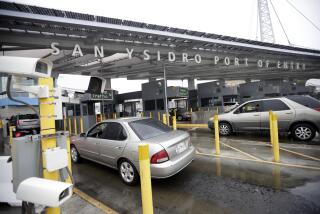Trial of Ex-Drug Agent Goes to the Jury : Courts: Darnell Garcia faces up to 95 years in prison if convicted on all counts. He is charged with narcotics trafficking and money laundering.
- Share via
Jury deliberations begin today in Los Angeles after a four-month trial in which federal prosecutors attempted to prove that a former U.S. Drug Enforcement Administration agent orchestrated a series of drug thefts that triggered the biggest scandal in the agency’s history.
“To put it simply,” Assistant U.S. Atty. Stefan Stein told jurors in closing arguments, “Darnell Garcia was a traitor, a traitor to his fellow agents and a traitor to his country.”
A defense lawyer, Mark Overland, declared that the prosecutors “purchased evidence” in the form of plea-bargain agreements with key witnesses whose testimony could not be trusted.
This week’s closing arguments in the courtroom of U.S. District Judge Terry J. Hatter Jr. climaxed a lengthy government corruption investigation and trial focusing on the DEA’s Los Angeles office.
Garcia, 44, of Rancho Palos Verdes, faces six charges of drug trafficking, money laundering and passing confidential intelligence information to a drug trafficking fugitive.
If convicted on all counts, he could be sentenced to a maximum of 95 years in prison and almost $6 million in fines.
Stein and co-prosecutor Joyce Karlin alleged that Garcia participated in 14 thefts of drugs and cash between 1982 and 1985.
Plea agreements with Garcia’s two former DEA partners and a convicted drug dealer, all of whom testified against Garcia, drew harsh words from Overland. He asserted that prosecutors “purchased evidence . . . and the government got what it paid for--liars, perjurers and those subject to threats.”
Garcia, who testified for more than a week, relied heavily on his personal date books from the 1980s to prove he was not present and could not have participated in any of the thefts. His savings of about $3 million in a Swiss bank, he said, represent commissions from gold jewelry smuggling for an Italian firm, a felony for which he is not currently charged.
Two of Garcia’s former DEA partners, John Jackson and Wayne Countryman, pleaded guilty last summer to drug trafficking. They testified that Garcia participated with them in a six-year spree that resulted in them depositing millions of dollars into Swiss bank accounts.
In exchange for their testimony implicating Garcia, prosecutors offered Jackson and Countryman the possibility of reduced prison sentences--yet to be approved by Hatter--and their freedom on bail until they are sentenced.
The trial included the following testimony:
* Jackson and a convicted Brooklyn drug dealer named Mahlon (Bunny) Steward testified how Garcia and Jackson pulled a “flim flam” in October, 1984, resulting in the theft of more than two pounds of almost pure heroin from the DEA’s evidence vault in Los Angeles.
* Jackson testified how, in July of 1984, he and Garcia pilfered almost $100,000 from the DEA cashier’s office.
* Jackson and Countryman told of a theft they participated in with Garcia in November, 1985, of 400 pounds of cocaine--with a street value of more than $18 million--from a Pasadena stash house. This theft, Stein said, “gave new meaning to the word corruption.”
Overland rationalized Garcia’s $3-million bank account by declaring that the defendant was heavily involved in smuggling and other operations of the Italian firm, Oro Aurora.
Overland also said the government chose never to trace all of Garcia’s deposits “because it supports his testimony” that he had a substantial stream of income unrelated to drug trafficking.
Overland rhetorically asked jurors if the government was being selective in what it was presenting as evidence because Garcia had been a key critic of the DEA’s minority personnel policies. He had won a court decision against the DEA reinstating him after he had been fired for refusing a transfer.
More to Read
Sign up for Essential California
The most important California stories and recommendations in your inbox every morning.
You may occasionally receive promotional content from the Los Angeles Times.













